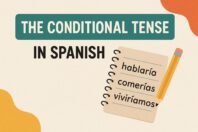Si Clauses in Spanish: 5 minute Guide to The Hypothetical

Get our free email course, Shortcut to Conversational.
Have conversations faster, understand people when they speak fast, and other tested tips to learn faster.
More infoYou may have heard about this concept before, but what exactly are Spanish Si clauses?
In this post, we’ll explore exactly what we mean by si clauses in Spanish and how they are used to for many hypothetical situations, whether it’s expressing a possibility, probability, wishes, excuses, suggestions, requests, and more.
To better understand this concept, let’s take a look at si clauses in action:
- If you do your homework, you can leave → Si haces tu tarea, puedes irte.
- If you are not busy tomorrow, can you help me? → Si no estás ocupado mañana, ¿puedes ayudarme?
- If you eat a lot of wasabi, you can get sick → Si comes mucho wasabi, te puedes enfermar.
It may help to think of si clauses as similar to if clauses in English.
In Spanish, they can refer to the present, past or future (i.e many tenses) in both the indicative and subjunctive mood.
(not familiar with the subjunctive? we recommend checking out this post)
How To Form Spanish Si Clauses?
Each sentence that contains a si clause is made up of two parts:
1) the condition that may or may not be fulfilled
2) the result or consequence if the condition expressed by the si clause occurs.
- If you were here, I would visit you →Si estuvieras aquí, te visitaría.
- Don’t go to school, if you are sick → No vayas a la escuela, si estás enfermo.
- If you don’t study, you won’t be able to pass the exam → Si no estudias, no podrás pasar el examen.
Si clauses can be affirmative or negative as you can see above:
- If → Si
- If … not/don’t → Si no
Now we have a good idea about how they’re formed, we’ll finish by reviewing the different ways in which si clauses can be used.
Five Different Ways To Use Spanish Si Clauses
1. Si Clauses in the present tense.
When both sentences are in present, they indicate that when performing one action, another one will be executed immediately
Formula: (si + present verb + result in present)
- If I’m hungry, I’ll eat → Si tengo hambre, yo como.
- If I get sick, I’ll go to the doctor → Si me enfermo, voy al doctor.
2. Si clauses combined: Present and future tense.
For an action in the future to take place, it will depend on whether an action in the present is concluded.
Formula: (Si + present verb + complement + result in future tense)
- If you leave your suitcase ready, you will have more time before going to the airport → Si dejas tu maleta lista, tendrás más tiempo antes de ir al aeropuerto.
- If you don’t take care of your cell phone, you will lose it → Si no cuidas tu celular, lo perderás.
3. Si clauses in present with an imperative result.
A good example of si clauses with commands.
Formula: (Si + present verb + result in imperative)
- If you want to quit, do it → Si quieres renunciar, hazlo
- If you are sleepy, go to sleep → Si tienes sueño, duerme
- If you want to travel, save money → Si quieres viajar, ahorra dinero
4. Si clauses formed with subjunctive mood and conditional.
If something happened in the past, it will cause an action in the future to be carried out.
Formula: (Si + verb in past imperfect subjunctive + simple conditional)
- If the boss were friendlier, the employees would not resign → Si el jefe fuera más amable, los empleados no renunciarían.
- If you had saved money, you would have enough to go on vacation → Si hubieras ahorrado dinero, tendrías suficiente para irte de vacaciones.
(Learn more about conditional sentences in Spanish here)
5. Si Clauses with pluperfect subjunctive and the conditional
The concept is similar to the previous one, but both conjugations are in the past.
It expresses that an action in the past did not occur, as a result of a preceding action not carried out.
This combination is useful for excuses :)
Formula: (SI+ pluperfect subjunctive + conditional compound)
- If I hadn’t been tired, I would have gone to dinner with you → Si no hubiera estado cansado, habría ido a cenar con ustedes.
- If I had more money, I would have stayed another month in Colombia → Si hubiera tenido más dinero, me habría quedado otro mes en Colombia.



